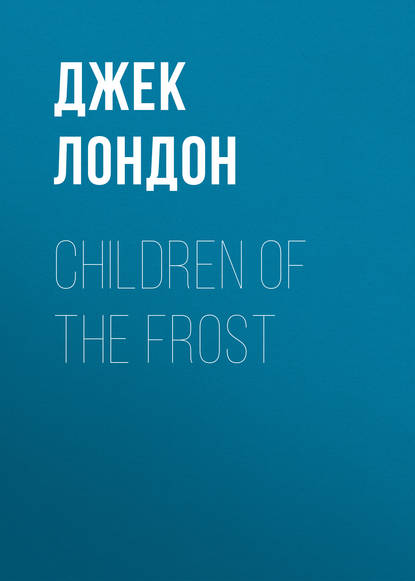По всем вопросам обращайтесь на: info@litportal.ru
(©) 2003-2024.
✖
Children of the Frost
Настройки чтения
Размер шрифта
Высота строк
Поля
Strive as he would to hide it, a growing anxiety was manifest, but Li Wan, groping after the words with which to paint the picture, took no heed.
"I see a snow-tramped space among the trees," she began, "and across the snow the sign of a man where he has dragged himself heavily on hand and knee. And I see, too, the man in the snow, and it seems I am very close to him when I look. He is unlike real men, for he has hair on his face, much hair, and the hair of his face and head is yellow like the summer coat of the weasel. His eyes are closed, but they open and search about. They are blue like the sky, and look into mine and search no more. And his hand moves, slow, as from weakness, and I feel …"
"Ay," Canim whispered hoarsely. "You feel – ?"
"No! no!" she cried in haste. "I feel nothing. Did I say 'feel'? I did not mean it. It could not be that I should mean it. I see, and I see only, and that is all I see – a man in the snow, with eyes like the sky, and hair like the weasel. I have seen it many times, and always it is the same – a man in the snow – "
"And do you see yourself?" he asked, leaning forward and regarding her intently. "Do you ever see yourself and the man in the snow?"
"Why should I see myself? Am I not real?"
His muscles relaxed and he sank back, an exultant satisfaction in his eyes which he turned from her so that she might not see.
"I will tell you, Li Wan," he spoke decisively; "you were a little bird in some life before, a little moose-bird, when you saw this thing, and the memory of it is with you yet. It is not strange. I was once a moose, and my father's father afterward became a bear – so said the shaman, and the shaman cannot lie. Thus, on the Trail of the Gods we pass from life to life, and the gods know only and understand. Dreams and the shadows of dreams be memories, nothing more, and the dog, whining asleep in the sun-warmth, doubtless sees and remembers things gone before. Bash, there, was a warrior once. I do firmly believe he was once a warrior."
Canim tossed a bone to the brute and got upon his feet. "Come, let us begone. The sun is yet hot, but it will get no cooler."
"And these white people, what are they like?" Li Wan made bold to ask.
"Like you and me," he answered, "only they are less dark of skin. You will be among them ere the day is dead."
Canim lashed the sleeping-robe to his one-hundred-and-fifty-pound pack, smeared his face with wet clay, and sat down to rest till Li Wan had finished loading the dogs. Olo cringed at sight of the club in her hand, and gave no trouble when the bundle of forty pounds and odd was strapped upon him. But Bash was aggrieved and truculent, and could not forbear to whimper and snarl as he was forced to receive the burden. He bristled his back and bared his teeth as she drew the straps tight, the while throwing all the malignancy of his nature into the glances shot at her sideways and backward. And Canim chuckled and said, "Did I not say he was once a very great warrior?"
"These furs will bring a price," he remarked as he adjusted his head-strap and lifted his pack clear of the ground. "A big price. The white men pay well for such goods, for they have no time to hunt and are soft to the cold. Soon shall we feast, Li Wan, as you have feasted never in all the lives you have lived before."
She grunted acknowledgment and gratitude for her lord's condescension, slipped into the harness, and bent forward to the load.
"The next time I am born, I would be born a white man," he added, and swung off down the trail which dived into the gorge at his feet.
The dogs followed close at his heels, and Li Wan brought up the rear. But her thoughts were far away, across the Ice Mountains to the east, to the little corner of the earth where her childhood had been lived. Ever as a child, she remembered, she had been looked upon as strange, as one with an affliction. Truly she had dreamed awake and been scolded and beaten for the remarkable visions she saw, till, after a time, she had outgrown them. But not utterly. Though they troubled her no more waking, they came to her in her sleep, grown woman that she was, and many a night of nightmare was hers, filled with fluttering shapes, vague and meaningless. The talk with Canim had excited her, and down all the twisted slant of the divide she harked back to the mocking fantasies of her dreams.
"Let us take breath," Canim said, when they had tapped midway the bed of the main creek.
He rested his pack on a jutting rock, slipped the head-strap, and sat down. Li Wan joined him, and the dogs sprawled panting on the ground beside them. At their feet rippled the glacial drip of the hills, but it was muddy and discolored, as if soiled by some commotion of the earth.
"Why is this?" Li Wan asked.
"Because of the white men who work in the ground. Listen!" He held up his hand, and they heard the ring of pick and shovel, and the sound of men's voices. "They are made mad by gold, and work without ceasing that they may find it. Gold? It is yellow and comes from the ground, and is considered of great value. It is also a measure of price."
But Li Wan's roving eyes had called her attention from him. A few yards below and partly screened by a clump of young spruce, the tiered logs of a cabin rose to meet its overhanging roof of dirt. A thrill ran through her, and all her dream-phantoms roused up and stirred about uneasily.
"Canim," she whispered in an agony of apprehension. "Canim, what is that?"
"The white man's teepee, in which he eats and sleeps."
She eyed it wistfully, grasping its virtues at a glance and thrilling again at the unaccountable sensations it aroused. "It must be very warm in time of frost," she said aloud, though she felt that she must make strange sounds with her lips.
She felt impelled to utter them, but did not, and the next instant Canim said, "It is called a cabin."
Her heart gave a great leap. The sounds! the very sounds! She looked about her in sudden awe. How should she know that strange word before ever she heard it? What could be the matter? And then with a shock, half of fear and half of delight, she realized that for the first time in her life there had been sanity and significance in the promptings of her dreams.
"Cabin" she repeated to herself. "Cabin." An incoherent flood of dream-stuff welled up and up till her head was dizzy and her heart seemed bursting. Shadows, and looming bulks of things, and unintelligible associations fluttered and whirled about, and she strove vainly with her consciousness to grasp and hold them. For she felt that there, in that welter of memories, was the key of the mystery; could she but grasp and hold it, all would be clear and plain —
O Canim! O Pow-Wah-Kaan! O shades and shadows, what was that?
She turned to Canim, speechless and trembling, the dream-stuff in mad, overwhelming riot. She was sick and fainting, and could only listen to the ravishing sounds which proceeded from the cabin in a wonderful rhythm.
"Hum, fiddle," Canim vouchsafed.
But she did not hear him, for in the ecstasy she was experiencing, it seemed at last that all things were coming clear. Now! now! she thought. A sudden moisture swept into her eyes, and the tears trickled down her cheeks. The mystery was unlocking, but the faintness was overpowering her. If only she could hold herself long enough! If only – but the landscape bent and crumpled up, and the hills swayed back and forth across the sky as she sprang upright and screamed, "Daddy! Daddy!" Then the sun reeled, and darkness smote her, and she pitched forward limp and headlong among the rocks.
Canim looked to see if her neck had been broken by the heavy pack, grunted his satisfaction, and threw water upon her from the creek. She came to slowly, with choking sobs, and sat up.
"It is not good, the hot sun on the head," he ventured.
And she answered, "No, it is not good, and the pack bore upon me hard."
"We shall camp early, so that you may sleep long and win strength," he said gently. "And if we go now, we shall be the quicker to bed."
Li Wan said nothing, but tottered to her feet in obedience and stirred up the dogs. She took the swing of his pace mechanically, and followed him past the cabin, scarce daring to breathe. But no sounds issued forth, though the door was open and smoke curling upward from the sheet-iron stovepipe.
They came upon a man in the bend of the creek, white of skin and blue of eye, and for a moment Li Wan saw the other man in the snow. But she saw dimly, for she was weak and tired from what she had undergone. Still, she looked at him curiously, and stopped with Canim to watch him at his work. He was washing gravel in a large pan, with a circular, tilting movement; and as they looked, giving a deft flirt, he flashed up the yellow gold in a broad streak across the bottom of the pan.
"Very rich, this creek," Canim told her, as they went on. "Sometime I will find such a creek, and then I shall be a big man."
Cabins and men grew more plentiful, till they came to where the main portion of the creek was spread out before them. It was the scene of a vast devastation. Everywhere the earth was torn and rent as though by a Titan's struggles. Where there were no upthrown mounds of gravel, great holes and trenches yawned, and chasms where the thick rime of the earth had been peeled to bed-rock. There was no worn channel for the creek, and its waters, dammed up, diverted, flying through the air on giddy flumes, trickling into sinks and low places, and raised by huge water-wheels, were used and used again a thousand times. The hills had been stripped of their trees, and their raw sides gored and perforated by great timber-slides and prospect holes. And over all, like a monstrous race of ants, was flung an army of men – mud-covered, dirty, dishevelled men, who crawled in and out of the holes of their digging, crept like big bugs along the flumes, and toiled and sweated at the gravel-heaps which they kept in constant unrest – men, as far as the eye could see, even to the rims of the hilltops, digging, tearing, and scouring the face of nature.
Li Wan was appalled at the tremendous upheaval. "Truly, these men are mad," she said to Canim.
"Small wonder. The gold they dig after is a great thing," he replied. "It is the greatest thing in the world."
For hours they threaded the chaos of greed, Canim eagerly intent, Li Wan weak and listless. She knew she had been on the verge of disclosure, and she felt that she was still on the verge of disclosure, but the nervous strain she had undergone had tired her, and she passively waited for the thing, she knew not what, to happen. From every hand her senses snatched up and conveyed to her innumerable impressions, each of which became a dull excitation to her jaded imagination. Somewhere within her, responsive notes were answering to the things without, forgotten and undreamed-of correspondences were being renewed; and she was aware of it in an incurious way, and her soul was troubled, but she was not equal to the mental exultation necessary to transmute and understand. So she plodded wearily on at the heels of her lord, content to wait for that which she knew, somewhere, somehow, must happen.
After undergoing the mad bondage of man, the creek finally returned to its ancient ways, all soiled and smirched from its toil, and coiled lazily among the broad flats and timbered spaces where the valley widened to its mouth. Here the "pay" ran out, and men were loth to loiter with the lure yet beyond. And here, as Li Wan paused to prod Olo with her staff, she heard the mellow silver of a woman's laughter.
Before a cabin sat a woman, fair of skin and rosy as a child, dimpling with glee at the words of another woman in the doorway. But the woman who sat shook about her great masses of dark, wet hair which yielded up its dampness to the warm caresses of the sun.
For an instant Li Wan stood transfixed. Then she was aware of a blinding flash, and a snap, as though something gave way; and the woman before the cabin vanished, and the cabin and the tall spruce timber, and the jagged sky-line, and Li Wan saw another woman, in the shine of another sun, brushing great masses of black hair, and singing as she brushed. And Li Wan heard the words of the song, and understood, and was a child again. She was smitten with a vision, wherein all the troublesome dreams merged and became one, and shapes and shadows took up their accustomed round, and all was clear and plain and real. Many pictures jostled past, strange scenes, and trees, and flowers, and people; and she saw them and knew them all.
"When you were a little bird, a little moose-bird," Canim said, his eyes upon her and burning into her.
"When I was a little moose-bird," she whispered, so faint and low he scarcely heard. And she knew she lied, as she bent her head to the strap and took the swing of the trail.
And such was the strangeness of it, the real now became unreal. The mile tramp and the pitching of camp by the edge of the stream seemed like a passage in a nightmare. She cooked the meat, fed the dogs, and unlashed the packs as in a dream, and it was not until Canim began to sketch his next wandering that she became herself again.
"The Klondike runs into the Yukon," he was saying; "a mighty river, mightier than the Mackenzie, of which you know. So we go, you and I, down to Fort o' Yukon. With dogs, in time of winter, it is twenty sleeps. Then we follow the Yukon away into the west – one hundred sleeps, two hundred – I have never heard. It is very far. And then we come to the sea. You know nothing of the sea, so let me tell you. As the lake is to the island, so the sea is to the land; all the rivers run to it, and it is without end. I have seen it at Hudson Bay; I have yet to see it in Alaska. And then we may take a great canoe upon the sea, you and I, Li Wan, or we may follow the land into the south many a hundred sleeps. And after that I do not know, save that I am Canim, the Canoe, wanderer and far-journeyer over the earth!"
She sat and listened, and fear ate into her heart as she pondered over this plunge into the illimitable wilderness. "It is a weary way," was all she said, head bowed on knee in resignation.

















